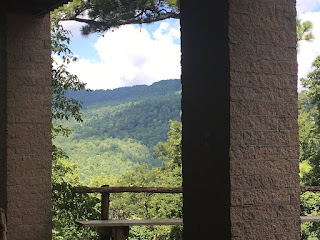 I have been a storyteller for thirty-two years. This is the only job I've had as a grown-up person. I get to travel the world and share stories with audiences of all ages. I love it.
I have been a storyteller for thirty-two years. This is the only job I've had as a grown-up person. I get to travel the world and share stories with audiences of all ages. I love it.One of the things that I have had to deal with over the course of my career is the fact that lots of people have no idea what a storyteller is or what one does. Sometimes I get quite frustrated by that.
If you've followed my blog for any period of time, you know I lose my cool every now and then.
If not, here are some links to some of my more colorful rants.
When Is A Storyteller Not A Storyteller?
When Administrators Attack!
They'll Never Sit That Long!
At the beginning of my career, I would go into high schools or middle schools and the principal would freak out.
Principal: "Where is your stuff?"
Me: "What do you mean?"
 |
| source |
Me: "No."
Principal: "No?"
Me: "No."
Principal: "What are you going to do?"
Me: "I am going to stand in front of your students and talk for forty-five minutes."
You could see the steel trap closing around their brain. All they are thinking is, "When I find out who invited this person to our school, I am going to skin them alive."
When the show was over, they would walk up to me dumbfounded and ask that question many an artist has gotten, "How did you do that?"
I suppose I thought that a day would come when that would not happen. A day would come when people understood what storytelling was, and understood why it connects with audiences.
Alas, it is not to be.
Last week I was in a number of schools. A few of them were K-2 schools. I had a principal sit right at the edge of the stage facing the kids because she thought she was going to have to jump on the stage and save me after about ten minutes. She was amazed k-2 students would sit for forty-five minutes.
Last week, I had a middle school administrator inform me that if she didn't like my content, or I started to lose the audience, she had no compunction about jumping onto the stage and stopping the show. I did three. She didn't have to stop any of them. She was amazed.
In honor of this nonsense, I have decided to coin a new term.
Fabulaphobia - (n) (fAb-yew-la-foe-be-ya) - the fear of hiring storytellers.
 |
| source |
There are still many schools and venues that are convinced storytelling will never work with an audience.
I fight this by sending schools in-depth information about how storytelling affects literacy, language acquisition, and vocabulary. I stress the fact that it improves language skills, communication both verbal and non-verbal, and it boosts confidence.
Still, people are worried that kids won't like it.
I am in residence for a second grade this week. The teachers are amazed at how much fun the kids are having working on kinetic writing and visualizations skills.
The teachers tell me that their curriculum no longer allows for the kinds of crafts kids used to do. Their imaginations are suffering because they don't spend enough time in unstructured play.
As I was leaving school today, the arts council board representative who sat in on my class said she was amazed at the way I was tying storytelling in with higher-level brain function as it relates to literacy.
I explained how the exercises worked and why I was doing them.
She said: "Somebody should do studies on how arts interact with the brain."
I replied: "We have lots of studies."
I left it there. sigh.
I have been in a number of schools over the last few weeks that were frustrating, but it hasn't been all annoyance. One school in particular sticks out for me.
It is a school with a heavy immigrant population. The ESL teacher deals with twenty-one languages. The kids sat in front of me in all of their multi-hued glory. They looked like America to me. Some girls had hijabs, some wore unicorn horns, some had cornrows, others had multihued thatch. The boys had everything from afros to shaved heads and much of their hair was multicolored and multi-length. They were every possible shade of brown from dark to light.
I turned to the administrator and said, "This gives me hope. At some point, these children will be in charge. They will grow up knowing what it is to have to become a polyglot to speak to their friends. They will grow up with kids from across the world. They will grow up understanding that everybody is "us" and that there is no single skin color or religion that makes a person "other".
The teacher smiled. "That's the most hopeful thing I've heard in a long time."
"Good," I said.
 |
| source |
Then, I told them stories and we rocked the house.
For schools that do not suffer from fabulaphobia, the world is an amazing place.
Happy Telling!





























